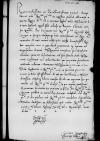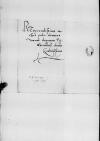Letter #2688
Erazm EUSTACHY to Ioannes DANTISCUSKaunas, 1543-11-27
| received Heilsberg (Lidzbark), 1544-01-25 Manuscript sources:
| ||||
Text & apparatus & commentary Plain text Text & commentary Text & apparatus
Reverendissimo in Christo Patri,
Reverendissime ac excellentissime Praesul.
Accepi litteras Vestrae Reverendissimae Paternitatis, in quibus scribit obtinuisse a sacra
Cuperem quidem in maioribus servitiis complacere Vestrae Reverendissimae Paternitati et illis, quibus Vestra Reverendissima Paternitas mandare dignabitur.
Tandem diutissime ac felicissime opto Vestram Reverendissimam Paternitatem valere.
Datum
Eiusdem Vestrae Reverendissimae Paternitatis servitor


 BCz, 1599, p. 378
BCz, 1599, p. 378